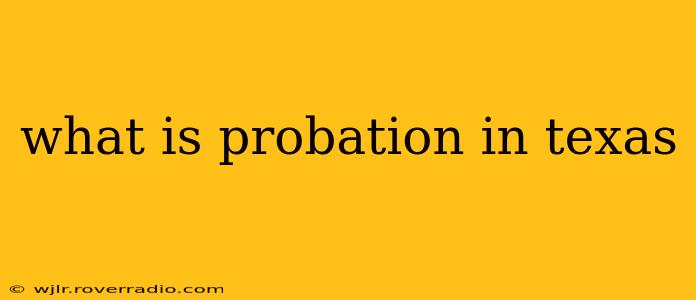Probation in Texas is a sentence imposed by a judge instead of incarceration. It allows convicted individuals to remain in the community under strict conditions and supervision, offering a chance for rehabilitation and avoiding the harsh realities of prison. Understanding Texas probation requires exploring its intricacies, from eligibility to violations and consequences. This guide will delve into the key aspects of Texas probation, answering many frequently asked questions.
What are the Different Types of Probation in Texas?
Texas offers various types of probation, each tailored to the specific circumstances of the offender and the severity of the crime. These can include:
- Community Supervision: This is the most common form of probation in Texas. It involves regular check-ins with a probation officer, adherence to specific rules and conditions, and potential participation in community service or other rehabilitative programs.
- Intensive Supervision Probation (ISP): This is a more restrictive form of probation, designed for individuals considered high-risk. It involves more frequent contact with a probation officer, stricter rules, and more stringent monitoring. This might include regular drug testing, curfews, and limitations on where they can go.
- Deferred Adjudication: This option allows the individual to avoid a formal conviction if they successfully complete the probationary period. If successfully completed, the charges are dismissed, and the individual avoids a criminal record.
What are the Conditions of Probation in Texas?
The specific conditions of probation vary depending on the individual's offense, criminal history, and risk assessment. However, common conditions often include:
- Regular check-ins with a probation officer: These meetings allow the officer to monitor the individual's progress and ensure compliance with the conditions of probation.
- Maintaining employment or seeking employment: This helps promote responsibility and self-sufficiency.
- Abstaining from alcohol and drug use: This is crucial for many offenders, often including regular drug testing.
- Following curfews: This ensures the individual is accountable for their whereabouts and promotes responsible behavior.
- Completing community service: This gives back to the community and helps the individual make amends for their actions.
- Participation in rehabilitation programs: These programs aim to address the underlying issues contributing to the criminal behavior, such as anger management, substance abuse treatment, or mental health counseling.
How Long Does Probation Last in Texas?
The length of probation in Texas varies considerably, depending on the severity of the crime, the individual's criminal history, and the judge's discretion. It can range from a few months to several years.
What Happens if I Violate My Probation in Texas?
Violating the conditions of probation can have serious consequences, including:
- Revocation of probation: This means the individual's probation is terminated, and they are sent to jail or prison to serve the original sentence.
- Increased supervision: The individual may face stricter probation conditions, such as more frequent check-ins with their probation officer, or even transfer to a more intensive supervision program.
- Additional fines or fees: These are meant to penalize the violation and to contribute to the costs of probation supervision.
Can Probation be Modified or Terminated Early in Texas?
In some cases, probation can be modified or terminated early if the individual demonstrates consistent compliance with the conditions of their probation and significant progress in rehabilitation. This often requires a petition to the court and a demonstration of positive changes in their life.
What is the Difference Between Parole and Probation in Texas?
Probation is a sentence imposed before incarceration, while parole is granted after a period of imprisonment. Parole is a conditional release from prison, allowing the individual to serve the remainder of their sentence in the community under supervision.
This information is for educational purposes only and is not a substitute for legal advice. Individuals facing criminal charges or probation issues should consult with a qualified Texas attorney.
